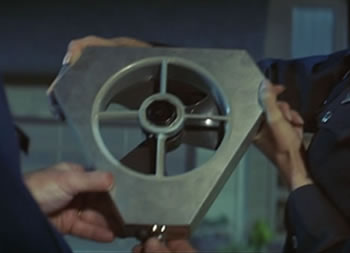Science Fiction
Dictionary
A B C D E F G H I J K L M N O P Q R S T U V W X Y Z
Honeywell Micro Air Vehicle Tested By Miami Police

The Miami-Dade Police department plans to evaluate the Honeywell ducted-fan Micro Air Vehicle for the next four to six months. The intent is to determine if MAVs can be useful in keeping the peace in urban environments.
(Honeywell MAV video)
The eighteen pound gas-powered device, which can remain in the air for almost an hour, has received an experimental airworthiness certificate from the US Federal Aviation Administration.
As you can see in the video, the Honeywell MAV can hover and manuever in tight spaces, like alleyways and even inside enclosed spaces.
Science fiction fans may recall the floater camera from 1985 movie Runaway, written and directed by Michael Crichton.

(Top view of floater camera from Runaway)
Police can maneuver this floating MAV inside houses to take a closer look at a hostage situation; see the in-dash control screen for the floater camera. If the Honeywell Micro Air Vehicle becomes standard equipment for police forces, you can bet that control devices will be built into police cars.
The Honeywell MAV has been extensively tested in Iraq; see Micro Air Vehicle In Use In Iraq for more details about the MAV, as well as additional science fictional precursors for this kind of device.
Via Miami police plans urban test of Honeywell's micro-UAV; thanks to Moira for pointing this one out.
Scroll down for more stories in the same category. (Story submitted 2/22/2008)
Follow this kind of news @Technovelgy.| Email | RSS | Blog It | Stumble | del.icio.us | Digg | Reddit |
Would
you like to contribute a story tip?
It's easy:
Get the URL of the story, and the related sf author, and add
it here.
Comment/Join discussion ( 2 )
Related News Stories - (" Surveillance ")
Perching Ambush Drones
'On the chest of drawers something was perched.' - Philip K. Dick, 1956.
India Ponders Always-On Smartphone Location Tracking
'It is necessary... for your own protection.' - Jack Vance, 1954.
LingYuan Vehicle Roof Drones Now Available, ala Blade Runner 2049
Accompanied by a small selection of similar ideas from science fiction.
Chameleon Personalized Privacy Protection Mask
'...the Virtual Epiphantic Identity Lustre.' - Neal Stephenson, 2019.
Technovelgy (that's tech-novel-gee!) is devoted to the creative science inventions and ideas of sf authors. Look for the Invention Category that interests you, the Glossary, the Invention Timeline, or see what's New.
Science Fiction
Timeline
1600-1899
1900-1939
1940's 1950's
1960's 1970's
1980's 1990's
2000's 2010's
Current News
The New Habitable Zones Include Asimov's Ribbon Worlds
'...there's a narrow belt where the climate is moderate.'
Can One Robot Do Many Tasks?
'... with the Master-operator all you have to do is push one! A remarkable achievement!'
Atlas Robot Makes Uncomfortable Movements
'Not like me. A T-1000, advanced prototype. A mimetic poly-alloy. Liquid metal.'
Boring Company Drills Asimov's Single Vehicle Tunnels
'It was riddled with holes that were the mouths of tunnels.'
Humanoid Robots Tickle The Ivories
'The massive feet working the pedals, arms and hands flashing and glinting...'
A Remarkable Coincidence
'There is a philosophical problem of some difficulty here...'
Cortex 1 - Today A Warehouse, Tomorrow A Calculator Planet
'There were cubic miles of it, and it glistened like a silvery Christmas tree...'
Perching Ambush Drones
'On the chest of drawers something was perched.'
Leader-Follower Autonomous Vehicle Technology
'Jason had been guiding the caravan of cars as usual...'
Golf Ball Test Robot Wears Them Out
"The robot solemnly hit a ball against the wall, picked it up and teed it, hit it again, over and again...'
Boring Company Vegas Loop Like Asimov Said
'There was a wall ahead... It was riddled with holes that were the mouths of tunnels.'
Rigid Metallic Clothing From Science Fiction To You
'...support the interior human structure against Jupiterís pull.'
Is The Seattle Ultrasonics C-200 A Heinlein Vibroblade?
'It ain't a vibroblade. It's steel. Messy.'
Roborock Saros Z70 Is A Robot Vacuum With An Arm
'Anything larger than a BB shot it picked up and placed in a tray...'
A Beautiful Visualization Of Compact Food
'The German chemists have discovered how to supply the needed elements in compact, undiluted form...'
Bone-Building Drug Evenity Approved
'Compounds devised by the biochemists for the rapid building of bone...'
